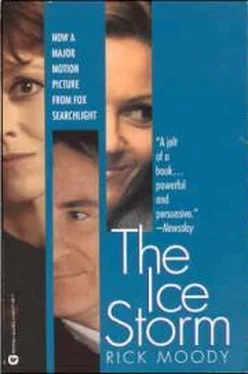Shackley and Schwimmer were Harvard-educated men who wore beards and studied like the Orthodox of their faith, though they were as secular as most of their Protestant counterparts. Sometimes they eschewed ties entirely or wore beat-up tweed jackets that must have been left over from their school days. Sometimes they ate at delicatessens and brought sandwiches back for the girls at the switchboard.
What did they have going for them? They were smarter then everyone else. Shackley and Schwimmer’s reputation rested on this simple arrogance. Prior to S&S, the world of brokerage had been a world of congeniality and fraternity. Guys who had gone to the same boarding schools and who belonged to the same country clubs or squash clubs doing business with one another. This fraternity was no guarantee of business acumen. Shackley and Schwimmer confronted old-boy business with academic disdain and with statistics — debt, assets, amortization, dividends, quarterly earnings figures. A little analysis, a few hot tips. The old brokerage houses weren’t prepared for it, and they didn’t like it. About this time Shackley himself devised an advertising campaign, perfected by one of the expensive Madison Avenue advertising firms, in which individual members of the Shackley and Schwimmer team were introduced in full-page advertisements. A huge full-face photograph, retouched, with copy beneath.
Hood remembered his own, from 1969, with both pride and embarrassment. “Benjamin Paul Hood, Dartmouth College, ’57. First Boston, ’58–’65. Shackley and Schwimmer, ’65–. Specialty: Media and Entertainment Businesses. Outlook: Bullish.” And then the company’s bold proclamation beneath. Shackley and Schwimmer — The Conventional Wisdom Is Wrong.
In the days following the advertisement, no one in the supermarket or at the country club mentioned it at all. It was as if the advertisement had fallen out of the paper altogether. As if its page had been excised or printed badly. No one mentioned it. Well, maybe the barber mentioned it, and the cleaning woman, but no one else. Hood wondered if it was the picture, of course. They had tried to whip his mottled, puffy features into an inoffensive and jolly paste. His beady eyes protruded from this pudding like some garnish, like unwanted raisins. They had clamped him into a tight shirt: he felt he would gag or asphyxiate during the photo session. And yet, his neck hung over that tightened collar, that tightened tie knot, like a precarious rock formation. Even Elena offered no encouragement about the advertisement.
With the picture began the problems at the office. George Clair arrived not long after, in 1969, at the age of twenty-four. Harvard B.A. and M.B.A. Though he arrived at the office unaware of the so-called Woodstock generation and the Summer of Love, Clair grew his hair when he arrived at Shackley and Schwimmer. He purchased a tweed jacket with patches already sewn on the elbows.
Clair gave new meaning to the idea of borrowed culture. He was full of cliches about Latin American debt and the ridiculousness of the Wage-Price Freeze, but he was more concerned with appropriating certain simplistic messages about film, music, and sports, and transporting them into the offices of his superiors. Ya gotta believe! Clair had remarked volubly throughout the autumn as the Mets scrambled for the pennant. Ya gotta believe! he would tell the secretary whose car had been towed. Ya gotta believe! he would say affably to Shackley about that weekend’s yacht club race or to Schwimmer about Nixon’s role in the conspiracy or the cover-up.
And there had been Last Tango in Paris. Most erotic film ever made, Clair had said to his secretary with that earnest and sheepish expression. Most erotic film, he said, while cleaning an ear with his pinkie. Then he would go down the hall to remind one of the institutional sales representatives. — Shachter, he would say, have you see Last Tango? What about that butter, huh? That crumbly butter? Most erotic film ever made! Shachter would look up from the phone, wave, and then shout it into the phone at the Fireman’s Fund. -Clair says see Last Tango. Most erotic film ever.
Hood began to be isolated within Shackley and Schwim-mer not long after Clair arrived. His assessments of things, of upcoming trends — suddenly they just didn’t want to hear from him at sales meetings. The salesmen began to report late on his revisions of quarterly figures, or they would double-check behind his back. Or they would ask who his sources were. As if he had to be joking. This was a long, slow, incremental process of isolation. Soon Shack-ley himself took up the issue. Hood was called into his office to explain why he hadn’t correctly identified the recent profit Gulf + Western was seeing, the profit as a result of Billy Jack.
— Isn’t this a relevant earnings uptick? Shackley said. Isn’t this altering their figures in a way we ought to be expecting?
Billy Jack? One tin soldier rides away? No one could have predicted the eminence of this Tom Laughlin, this established antiestablishment, middle-aged hippie in the Indian hat, who eliminated his antagonists with warmed-over martial arts. No one could have anticipated it. Except, as it turned out, George Clair.
The office problems became worse during Clair’s romance with Last Tango. Of course, Hood didn’t go around talking about Bank of America or First National — Clair’s specialties. Out of the blue, though, Clair loved movies. Clair was first to discuss home videotaping and Super-8 as consumer electronics items that would soon transform the entertainment business. He was first to understand the importance of tabloid point-of-purchase magazines. At the weekly research meetings, Clair was constantly leaping in to help out with the media and entertainment securities. And it wasn’t that he wanted to cover entertainment stocks: he just wanted the space Benjamin Hood took up, Hood’s air and water and space and pension and office. Clair’s photograph was a gleaming pinup. He was a Best and Brightest male model. A Harvard M.B.A. who could play touch football and get misty-eyed over a Saturday Evening Post cover. By the time of Clair’s ad in the Journal, in 1971, Hood was beginning to see implications wherever he turned. Overlooked for an important lunch, not copied on an important memo, not tipped off on a hot stock. The hypocrisy and surveillance of office politics were closing in on him. There was a positive side to all this: Hood could read annual reports in peace; he could borrow them from the firm library for weeks. He could do the crossword puzzle and correspond with his accountant. The phone never stirred in his office. He knew the trouble that lay ahead. But he hadn’t told his wife, hadn’t sought the counsel of his friends, hadn’t considered the future. He couldn’t say it out loud. He knew what was coming.
While crosshatching his face each morning with the Wilkinson double-bonded. Hood swore that he would never live life like George Clair, at the expense of others, if he ever worked again — after that pink slip turned up in his In box. He would be a benevolent supervisor, a friend and confidante to working men and women, no matter how insignificant their positions. Then he would arrive late at the office and shout down his secretary, Madeleine, for failing to make his coffee light enough. Get your ass down there and get another cup! He was digging his own grave and holding it like a pearl inside of him.
— Clair, George Clair, he said, overfilling his glass, plucking a single ice cube from the silver ice bucket. What a surprise.
— Benjie!
Firmly they clasped one another’s hands. Clair’s expression was inoffensive and slyly confused. Smile lines skirted the planes of his face.
Читать дальше












